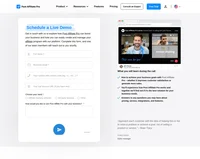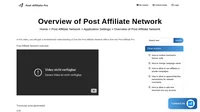What is a pay per click?
Pay Per Click (PPC) is an online advertising model where advertisers pay a fee each time their ad is clicked. It serves as a method for buying visits to a website instead of earning them organically. PPC is a fundamental element of digital marketing, providing a structured approach for advertisers to reach their target audience efficiently. This model is predominantly associated with search engines like Google and Bing, where advertisers bid for ad placement in search results.
Furthermore, PPC extends to social media platforms and display networks, offering various ad formats to target specific user demographics and behaviors.
How PPC Works in Affiliate Marketing
In the realm of affiliate marketing, PPC is used as a strategic tool for affiliates to promote products or services and earn commissions based on user interactions with their ads. Affiliates play a key role in driving traffic to merchants’ websites, aiming for conversions such as sales or sign-ups. The process involves strategic keyword targeting, ad placement and bidding, ad creation and optimization, and performance tracking and analysis. Affiliates must manage their PPC budgets carefully, balancing advertising costs with potential commission earnings to ensure profitability.

Components of a PPC Campaign
- Keyword Research: This involves identifying terms that the target audience is searching for, using tools like Google Keyword Planner and SEMrush.
- Ad Creation: Crafting effective ad copy with a strong headline and clear call-to-action is crucial.
- Landing Pages: These pages must align with the ad’s message and be optimized for conversions, ensuring a seamless user experience.
- Bidding Strategy: Affiliates choose from various bidding strategies, such as CPC or CPA, based on campaign goals.
- Tracking and Analysis: Utilizing tools like Google Analytics to monitor key metrics such as CTR, conversion rates, and ROI.
Benefits of PPC in Affiliate Marketing
- Targeted Audience Reach: Precision targeting ensures ads reach users most likely to convert.
- High ROI: The PPC model’s pay-per-click nature often results in higher ROI compared to other advertising methods.
- Quick Entry and Scalability: PPC campaigns can be rapidly deployed and scaled up when successful.
- Measurable Results: Detailed analytics allow for data-driven optimization of campaigns.
- Brand Visibility: PPC enhances brand awareness, even from non-clicked ads.
Types of PPC Affiliate Programs
Google AdSense: Offers diverse ad formats and integrates with Google Analytics.
- Media.net: Provides high revenue share and contextual ad matching.
- Amazon Associates: Known for a vast product selection and detailed reporting.
- Skimlinks: Converts product links into affiliate links, ideal for content-heavy sites.
- PropellerAds: Offers advanced targeting and various ad formats.
- Bidvertiser: Competitive bidding and real-time reporting.
Choosing the Right PPC Affiliate Program
- Program Requirements: Consider traffic levels and content quality.
- Compensation Details: Understand commission structures and payment thresholds.
- Ad Formats: Evaluate the diversity and customization of ad formats.
- Support and Resources: Look for programs with robust training and support.
- Alignment with Niche: Ensure relevance to your target audience and brand reputation.
Integrating PPC with Affiliate Marketing
- Referral Programs: Leverage bonuses for expanding networks.
- Combining SEO and PPC: Maximize visibility through dual strategies.
- Content Marketing Integration: Use PPC to promote valuable content.
- Social Media and PPC: Reach broader audiences with coordinated campaigns.
- Email Marketing and PPC: Use PPC to re-engage subscribers and generate leads.
Challenges and Considerations
Compliance and Regulations: Adhere to advertising regulations and disclose affiliate relationships.
Competition and Costs: High costs for popular keywords require careful budget management.
Ad Fatigue: Continually refresh ad creatives to maintain engagement.

This guide is tailored for beginners, offering a comprehensive overview of PPC advertising, an essential tool in the affiliate marketer's toolkit. Let's delve into the world of PPC and explore how it can significantly amplify your affiliate marketing efforts.
Understanding PPC Advertising
PPC advertising is a model where advertisers pay a fee each time their ad is clicked. Essentially, it’s a way of buying visits to your site, rather than attempting to earn those visits organically. PPC ads can lead to website visits, app downloads, phone calls, or even physical store visits. This flexibility makes it a powerful tool for promoting a wide range of affiliate products and services.
Why Use PPC in Affiliate Marketing?
-
Promotion of Offers and Discounts: PPC allows businesses to highlight their current offers, discounts, and services efficiently. For affiliates, this means driving targeted traffic to specific promotions, increasing the likelihood of conversions.
-
Trackable Metrics: With PPC, affiliates can easily track metrics such as total clicks, cost per click, and return on ad spend. This data is crucial for optimizing campaigns and ensuring a positive ROI.
-
Targeted Advertising: PPC ads are highly targeted, allowing affiliates to reach audiences most likely to convert. This targeting can be based on search keywords, demographics, or user behavior, ensuring your ads are seen by the right people.
How Does PPC Work?
Consider a scenario where you're an affiliate promoting golf clubs. By using PPC, when someone searches for "golf clubs" on Google, your ad appears at the top of the search results. If they click on your ad, you're charged for that click, and the user is directed to your affiliate landing page.
Key PPC Platforms for Affiliates
Affiliates should consider starting with major platforms like Google Ads and Microsoft Advertising. These platforms provide extensive reach and robust targeting options. Once comfortable, affiliates can explore other platforms such as:
- Facebook Ads
- Instagram Ads
- LinkedIn Ads
- Amazon Advertising
Each platform offers unique advantages, and diversifying ad channels can lead to broader audience reach and potentially higher conversions.
FAQs
Q1: Is PPC advertising suitable for all affiliate marketers?
A1: Yes, PPC advertising can be beneficial for all affiliates, regardless of niche, as it allows targeted promotion of products and services.
Q2: How much should I budget for a PPC campaign?
A2: Start with a budget you're comfortable with, and scale as you see positive returns. Many affiliates start small and increase their spend as their campaigns become profitable.
Q3: How can I optimize PPC campaigns for better results?
A3: Regularly analyze performance metrics, adjust targeting and keywords based on data, and continuously test ad creatives and landing pages for improved conversions.
Conclusion
PPC advertising is a potent tool for affiliate marketers aiming to boost their online presence and drive more conversions. By understanding the basics and leveraging the right platforms, affiliates can effectively harness PPC to complement their marketing strategies. Ready to supercharge your affiliate marketing efforts with PPC? Start by setting up your first campaign today and watch your affiliate income grow!
Call to Action: Dive deeper into the world of PPC and affiliate marketing. Explore our affiliate software solutions to streamline your campaigns and maximize your returns!
Frequently Asked Questions
How can I earn from pay-per-click?
Pay-per-click is a way for you to earn money from your website by charging advertisers for each ad that is clicked on by a visitor to your site.
How much does affiliate marketing pay per-click?
There is no set amount that affiliate marketing pays per-click, as it varies depending on the affiliate program and the advertiser. Some affiliate programs may pay as little as $0.01 per click, while others may pay as much as $5.00 per click.
How do you do affiliate marketing with PPC?
There are many different ways to approach affiliate marketing with PPC. Some affiliates choose to focus on building up a large following on social media, while others invest in paid advertising to reach a wider audience.
Discover Post Affiliate Pro's flexible pricing plans tailored to fit your business needs, with options for Pro, Ultimate, and Network packages. Enjoy a free trial with no credit card required, no setup fees, and the freedom to cancel anytime. Benefit from features like unlimited affiliates, advanced reporting, customizable interfaces, and lifetime support. Save up to 20% with annual billing and take advantage of more than 220 integrations. Perfect for businesses seeking to enhance their affiliate marketing efforts. Visit now to find the ideal plan for you!
The leader in Affiliate software
Post Affiliate Pro offers a comprehensive affiliate software platform to manage multiple affiliate programs with ease. Enjoy no setup fees, 24/7 customer support, and a free 1-month trial. Ideal for small and large businesses, it features precise tracking, automated workflows, and customizable tools to boost your affiliate marketing success. Try it now and streamline your affiliate operations effortlessly!
A guide to different types of affiliate tracking
Explore the comprehensive guide on affiliate tracking methods like cookie, postback URL, and IP tracking to optimize your affiliate marketing strategy. Learn how Post Affiliate Pro's advanced software ensures precise tracking, maximizes sales, and provides exceptional support for seamless affiliate cooperation. Unlock your brand's potential with cutting-edge tracking solutions today!
Overview of Post Affiliate Network
Discover the power of Post Affiliate Network for managing affiliate programs across multiple brands from a single account.
Discover the essential role of affiliate software in managing and optimizing your affiliate marketing programs. Learn how it streamlines link tracking, referral management, and commission payments, ensuring data security and fraud prevention. Unlock growth opportunities with efficient program management and boost your business's reach and ROI. Visit now to explore the benefits of investing in affiliate software!










